An Introduction to Public Holidays in South Korea
Public Holidays in South Korea
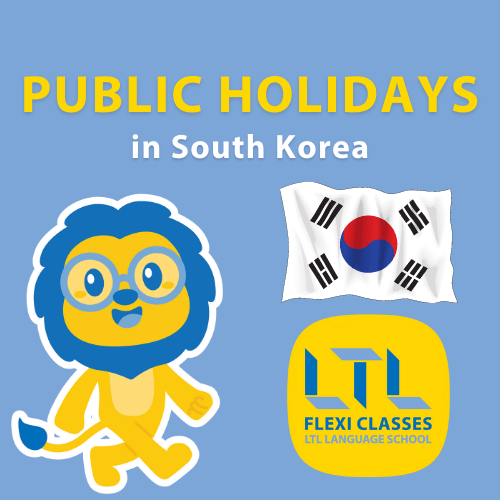
There are eleven public holidays in South Korea, which employers are legally obligated to give their workers days off.
A few of these holidays may seem familiar, but most newcomers to Korean culture will never have heard of them.
FOR EXAMPLE | Did you know Christmas is in fact a holiday in Korea (it isn’t in China for example)
Holidays in South Korea derive from Korean history, broader East Asian culture, and Western influence.
Thus, learning about these holidays is like learning about a rich slice of Korean culture and society.
Let’s explore what these holidays are.
Public Holidays in South Korea | New Year’s Day [1/01]
Public Holidays in South Korea | Seollal
Public Holidays in South Korea | March 1st Movement Day [3/01]
Public Holidays in South Korea | Labour Day [5/01]
Public Holidays in South Korea | Children’s Day [5/05]
Public Holidays in South Korea | Buddha’s Birthday
Public Holidays in South Korea | Memorial Day [6/06]
Public Holidays in South Korea | Liberation Day [8/15]
Public Holidays in South Korea | Chuseok
Public Holidays in South Korea | Hangul Day [10/09]
Public Holidays in South Korea | Christmas [12/25]
New Year’s Day – 신정 [shinjeong]
1st January
The first Korean holiday is the International New Year’s Day, which always falls on January 1st.
This holiday does not need much explanation.
After all, it’s the standard new year celebrated all over the world.
South Korea does not have any special traditions for this day, and it’s usually enjoyed just as a generic day off work or school.
Seollal – 설날 – The Korean New Year
1st day of the traditional Korean calendar
Seollal is the Korean New Year.
It lasts three days, and begins on the first day of the Chinese lunisolar calendar, usually in January/February.
The Chinese lunisolar calendar is the calendar that was traditionally used in Korea and several other Asian countries.
That’s why many Asian countries have traditional new year celebrations at the same time, known primarily in the Western world as “Chinese New Year” or “Lunar New Year.”
Seollal is one of the two big traditional holidays in Korea (with the other being Chuseok, listed down below).
During Seollal, people are expected to go back to their hometowns and gather with their extended family.
There are many traditional customs that take place of Korean New Year, such as games, foods, and spending precious time with loved ones.
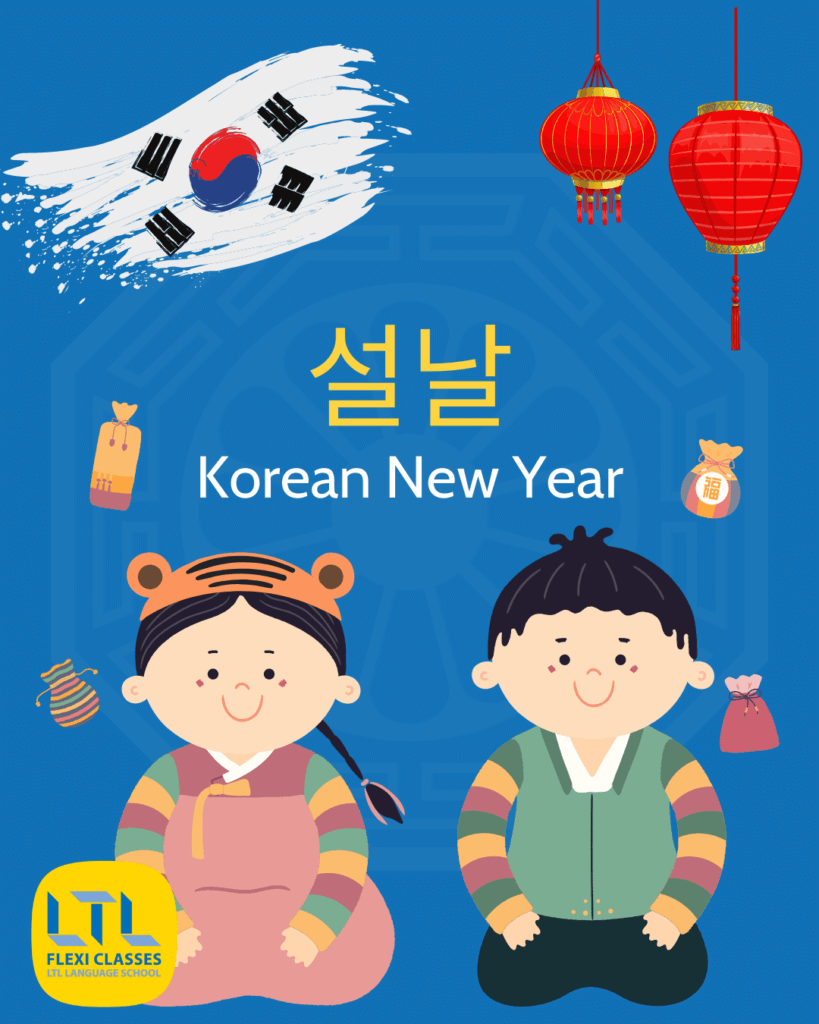
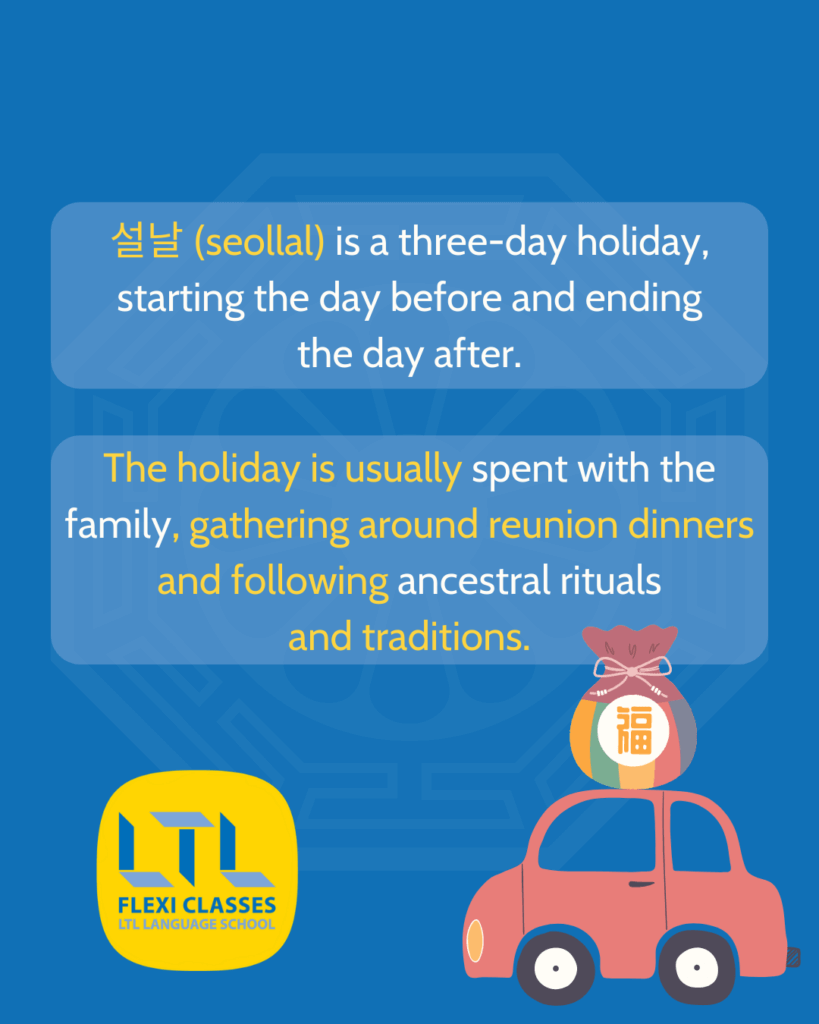
March 1st Movement Day – 삼일절 [samiljeol]
1st March
As the name implies, this holiday always falls on the first of March.
March 1st Movement Day is also known as Independence Movement Day, because it celebrates a famous protest movement by the Korean people during the Japanese occupation.
While this movement ended in failure with thousands killed, it was a pivotal moment in Korean history.
There are no particular customs or traditions for this holiday. Instead it’s intention is to be a day of rest and reflection.
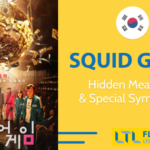
Squid Game Cultural References // Hidden Meanings and Symbolism
If you haven’t watched this show yet: why?? Find out about Squid Game cultural references in characters’ names, episodes’ titles, games and more!
Labour Day – 노동절 [nodongjeol]
1st May
Labour Day is the same date across the world, May 1st.
However, unlike other countries Labour Day, or Worker’s Day or May Day, is not an official public holiday in Korea.
Here’s an interesting extract from publicholidays.co.kr:
“According to the Labor Day Act, employers can stipulate that 1 May be made an official holiday within the company’s rules of employment. For instance, banking institutions and most commercial business are closed that day.”
Children’s Day – 어린이날 [eorininal]
5th May
Children’s Day falls on May 5th of every year. It is a day to honour and celebrate children.
In Korea, Children’s Day is easily one of the most popular holidays among children.
Not only do they get the day off from school, it’s common for parents to buy them presents and take them out for trips to places like amusement parks or museums.
If you’re a childless adult, this holiday probably won’t mean much to you. But it’s still nice to get the day off!
Buddha’s Birthday – 부처님오신날 [bucheonnim osinnal]
8th day of the 4th month of the Korean calendar
Korea commemorates Buddha’s birthday as a national holiday.
It falls on the eighth day of the fourth month in the traditional Korean calendar (also known as the Chinese lunisolar calendar), usually in May.
Buddhism has traditionally been a major religion of Korea, and although it’s not as prominent as it once was, it still continues to exert its influence.
Buddha’s Birthday is meant to commemorate the birth of the Gautama Buddha, the founder of Buddhism, also known as Siddhartha.
In Korean, this holiday is called 부처님 오신 날 [bucheonnim osinnal], which literally translates to “the day Lord Buddha came.”
Lotus lanterns are strung throughout streets, temples, and other various places, making for a striking visual.
Most Buddhist temples host events, such as festivals and celebrations, in which anyone is welcome to join.
Memorial Day – 현충일 [hyeongchungil]
6th June
Korean Memorial Day is held on June 6th.
It is a public holiday meant to honour those who died in military service, just like the memorial day of any other country.
There are no particular celebrations or traditions for this day, though there are usually statements and speeches made by important politicians.
Liberation Day – 광복절 [gwangbokjeol]
15th August
Liberation Day, or Korean Independence Day takes place on August 15th.
This day celebrates Korea’s independence from Japan after decades of colonial rule.
The day is called 광복절 [gwangbokjeol] in Korean, which translates into “the festival of the restoration of light.”
While there are no traditions or customs for this day, it is common for politicians to make speeches or statements.
Certain venues such as museums may hold events to honour this holiday.
Chuseok – 추석 – Mid-Autumn Festival
15th day of the 8th month of the Korean Calendar
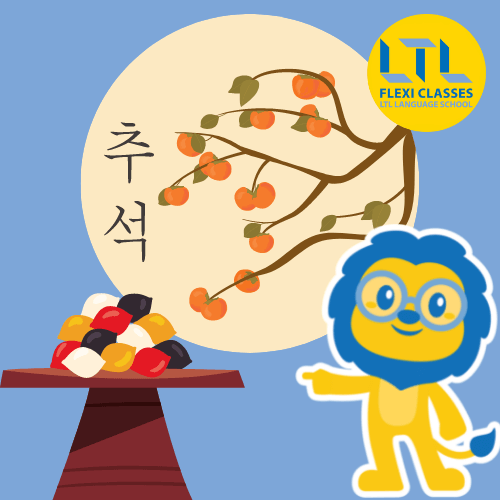
Chuseok is a traditional harvest festival, and it’s one of the two biggest holidays in Korea.
Chuseok falls on the fifteenth day of the eighth month in the traditional Korean calendar.
Chuseok is a long holiday that lasts three days and usually falls in September.
Similar to Seollal, people go back to their hometowns and gather with extended family members.
They eat traditional food and engage in traditional games and customs, most notably ancestor veneration.
Hangul Day – 한글날 [hangeulnal]
9th October
Hangul Day takes place on October 9th. It is a celebration of the Korean alphabet and literacy which has a fascinating history.
한글 [hangeul] is the Korean alphabet that is widely used today.
However, Koreans traditionally used Chinese characters, called 한자 [hanja], in order to read and write.
It was difficult for low-class Korean people to learn Chinese characters, as they did not have the time to study and memorise thousands of characters like the upper class did.
To address this issue, in 1443, King Sejong unveiled a new alphabet – Hangul.
Unlike Chinese characters, this new writing system was phonetic, which meant the writing was based on sounds, instead of each character having an individual meaning, making Hangul a much easier system to learn.
There are no special customs or traditions for Hangul Day, but many institutions such as museums and cultural centres host fun events.

Christmas Day – 크리스마스 [keuriseumaseu]
25th December
Last but not least, Christmas. Needless to say, it takes place on December 25th.
Apart from religious Christians who may participate in church services, Koreans do not celebrate Christmas the same way that Western countries do.
Instead of a big family holiday, it is seen as a relaxed day off from work or school.
As a matter of fact, it is popularly seen as a great day for couples to meet up!
A fun Christmas custom in Korea is the Christmas cake.
It is common to buy a cake to celebrate Christmas, to the point where cake sales spike up during this holiday.
The bakeries really put in a lot of effort, crafting all sorts of beautiful cakes in various designs and flavours.
There you have it, all 11 public holidays in South Korea where people enjoy time off!
If you’d like to keep learning about the Korean culture and the country, have a look at the following blog articles:
- Korean Names – What are the naming customs in South Korea?
- The Best Korean Food – Top 10 dishes for foodies to try out
- Korean Words in English – New words in the Oxford English dictionary (2022)
- Korean Loanwords – 63 Korean words you never knew you knew
To know more about public holidays in other countries, check out these pages:
- National Holidays in Mainland China
- National Holidays in Taiwan
- National Holidays in Japan
- National Holidays in Vietnam
Public Holidays in South Korea – FAQ’s
How many public holidays are there in South Korea?
There are eleven public holidays in South Korea, which employers are legally obligated to give their workers days off.
Only May 1st, Worker’s Day, is not considered an official holiday but is optional.
Is there a Korean New Year?
Yes, the Korean New Year is Seollal – 설날.
It lasts three days, and begins on the first day of the Chinese lunisolar calendar.
Seollal is one of the two big traditional holidays in Korea (with the other being Chuseok, listed down below).
During Seollal, people are expected to go back to their hometowns and gather with their extended family.
There are many traditional customs, such as games, foods, and ancestor veneration.
What is Chuseok?
Chuseok (추석) is a traditional harvest festival, and it’s one of the two biggest holidays in Korea.
Chuseok falls on the fifteenth day of the eighth month in the traditional Korean calendar (also known as the Chinese lunisolar calendar).
Chuseok is a long holiday that lasts three days and usually falls in September.
Similar to Seollal, people go back to their hometowns and gather with extended family members, where they eat traditional food and engage in traditional games and customs, most notably ancestor veneration.
What is Hangul Day?
Hangul Day 한글날 [hangeulnal] takes place on October 9th. It is a celebration of the Korean alphabet, that was created by King Sejong in 1443.
There are no special customs or traditions for Hangul Day, but many institutions such as museums and culture centers host fun events.
Do South Korea celebrates Children’s Day?
Yes. Children’s Day 어린이날 [eorininal] falls on May 5th of every year. It is a day to honour and celebrate children.
In Korea, Children’s Day is easily one of the most popular holidays among children.
Not only do they get the day off from school, it’s common for parents to buy them presents and take them out for trips to places like amusement parks or museums.
Want More From LTL?
FANCY LEARNING KOREAN? Check out our online Korean courses here.
We offer a 7-day free trial to all online students where you can study Korean 24/7.
Want to study Korean in Korea instead? Our Korean courses in Seoul can either be taken in small groups of no more than 5 students or individually for a more tailored experience.
We even offer incredible homestay experiences in Seoul too.
To top it all off, it certainly doesn’t end with Korean. Check out the other languages we teach 👇🏻








